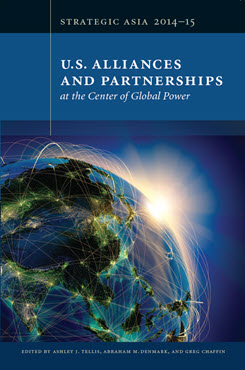U.S.-Taiwan Relations
Hobson's Choice and the False Dilemma
This chapter from Strategic Asia 2014–15 examines the contemporary history and current trajectory of U.S.-Taiwan relations in the context of trends in cross-strait relations and assesses the choices facing leaders in Taipei and Washington and their impact on the future of the bilateral relationship.
EXECUTIVE SUMMARY
This chapter examines the contemporary history and current trajectory of U.S.-Taiwan relations in the context of trends in cross-strait relations and assesses the choices facing leaders in Taipei and Washington and their impact on the future of the bilateral relationship.
MAIN ARGUMENT
The current trajectory of U.S.-Taiwan relations requires recalibration. The status quo as it has stood for the past 35 years is unsustainable. An increasing imbalance between Taipei and Beijing in terms of military capabilities, China’s economic leverage over Taiwan, and a widening sovereignty gap are subjecting Taiwan ever more to Beijing’s coercive pressures. The current U.S. approach to Taiwan is being misguided by a fallacy of false choices due in part to excessive policy deference to Beijing’s one-China policy. Despite the thaw in cross-strait tensions, without a corresponding shift in U.S.-Taiwan relations, Taipei will move further toward a situation where it faces a Hobson’s choice —and Washington, if it fails to act, a real dilemma.
POLICY IMPLICATIONS
- With the straightforward agreements in cross-strait negotiations out of the way, Chinese leaders are stepping up pressure on the Ma administration to engage in sensitive political dialogue. The 2016 election in Taiwan will be viewed by Beijing as a test of its policy approaches toward Taiwan.
- The economic relationship between Taiwan and China is characterized by growing interdependency and political separation. However, the trend line for the medium to long term is less clear if China’s economic leverage over Taiwan continues to increase.
- China is likely to increasingly rely on military and economic coercion to compel political concessions from Taiwan on sovereignty. Therefore, U.S. military, political, and economic support will be critical for maintaining Taipei’s confidence in engaging with Beijing in cross-strait negotiations.
Strategic Asia
The Strategic Asia annual edited volume incorporates assessments of economic, political, and military trends and focuses on the strategies that drive policy in the region. Learn more about Strategic Asia.


